|
Гипермаркет знаний>>Английский язык>>Английский язык 11 класс>> Module 3 Responsibility
MODULE 3
Responsibility
Before you start...
• What do you do to relieve stress?
• Would you volunteer for a charity? Why?
Look at Module 3
Find the page numbers for pictures 1 -4.
Find the page numbers for
• a proverb
• a poem
• a biography
• a quiz
Listen, read and talk about...
• crime & the law
• rights & responsibilities
• Great Expectations by Charles Dickens
• Ellis Island and the Statue of Liberty
• The Universal Declaration of Human Rights
• How to be a Green citizen
Learn how to ...
• express regret
• express outrage & disgust
Practise ...
• the -ing form, to-infinitive, infinitive without to
• phrasal verbs: keep
• words often confused: offence/crime, taken/driven, unlawful/illegal, announce/find, sentence/imprisonment, wi tnesses / suspects
Write / Make / Give ...
• an opinion essay
• a short text about a famous monument
• a presentation about a charity organisation
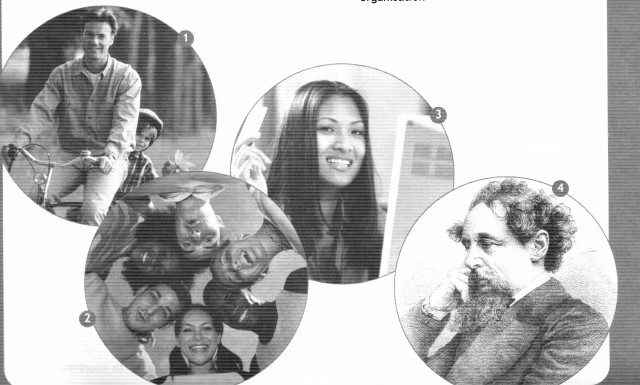

Sail to Liberty and Ellis Islands in New York City's harbour and see the world's most symbolic monument to freedom and the 1).............(history) gateway to America!
Ellis Island
Between 1892 and 1954, more than 12 million, mainly passengers sailing third-class from Russia, Italy, Ireland and many other 2) .......... (Europe) countries, passed through the immigration station on Ellis Island in search of democracy, freedom and opportunity. In fact, about 50% of Americans have at least one ancestor who entered the USA through Ellis Island! Here, each would-be immigrant had to meet strict health and legal 3)..............(require) before they were allowed to begin their new lives as American citizens.
Liberty Island and the Statue of Liberty
For millions of 4)...........(immigrate), the Statue of Liberty was the first 5)................(see) they had of their new homeland as they sailed into New York Harbour. Given to America as a gift from the French in 1884, it. stands 93m tall and depicts a woman dressed in a loose-fitting robe escaping 6)..............(oppress), symbolised by the shackles1 which lie at her feet. In her right hand she holds a torch, representing liberty, and in her left she holds a tablet reading "July 4th, 1776" - the date Lof the 7)...............(declare) of American Independence. She wears a crown with seven sun-like rays on her head, representing the seven continents and seas of the world. On your tour of Liberty Island, take a look inside 'Lady Liberty' and visit the museum to see a life-size replica of the statue's face and foot. Don't miss the 8)...............(fame) inscription by Emma Lazarus which has come to symbolize the statue's message of hope for those coming to America or searching for freedom around the world!
1chains around someone's wrists or ankles
"Give me your tired, your poor, your huddled masses1 yearning2 to breathe free... I lift my lamp beside the golden door."
(Emma Lazarus, American poet, 1883)
1 refers to the ordinary people in society zwanting very much
2 wanting very much
1 What is the monument in the picture? Where is it? What else do you know about it?
2 Read the extract from the poem symbolising the message of the statue. What do you think the message is? Read the text and check.
3 RNE Complete the gaps with the correct words derived from the words in brackets. Explain the words in bold.
4 Listen and read the text again. Imagine you are a tour guide. Use the text to give your guided tour to these two monuments.
> As we get off the boat here at Ellis Island, imagine how the first immigrants felt as they...
5 Portfolio: Write a short text about a famous monument in your country. Include:
• what/where the monument is
• what it means/represents
• what a visitor can see/do there
Citizenshi ACROSS THE CURRICULUM
1 Read article 1 of the Universal 1 Declaration of Human Rights (UDHR) below, then discuss the questions (1-2) in small groups.
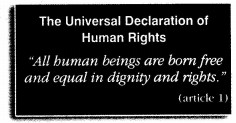
1 What are human rights? Who are they for? Why are they important?
2 What is The Declaration of Human Rights?
2 a RNE Read the headings. What do you expect to read in each paragraph in the text? Read again and match the heading (A-E). There is one heading that you do not need to use.
A Rights for all!
B Adopting the declaration
C Protecting freedom
D Rights violations
E Human rights history
b Listen and read the text again. Explain the words in boid.
3 Portfolio: Work in groups. Find out about a charity or organisation that protects human rights e.g. UNICEF, UN, Amnesty international and precent it to the class. You could find out: where its offices are, what it does, who it protects, how you can get involved etc.
It's my right
1> Think about how often you drink clean water, eat food, go to school or university, say or write what you think, and practise your religion (or not). These are all basic human rights, or things that you are morally or legally entitled to do or have. They are the same for everyone, regardless of sex, age, race, nationality or social class. They are extremely important, as they are about recognising the value and dignity of all people, everywhere and at all times!
2> Human rights weren't invented recently! Discussion of them dates back to the earliest civilisations. It wasn't until after the cruelties and injustices that took place during the Second World War, however, that it was decided that protection of human rights should be an international concern.
3> On December 10th, 1948, the United Nations adopted the Universal Declaration of Human Rights (UDHR) in New York. It has thirty articles and protects the right to life, work, housing, free thought and many other things. Since 1948, nearly every country in the world has signed one or more agreements designed to protect the rights in the UDHR.
4> Unfortunately, just because the UDHR exists, it does not mean that human rights are never violated! In some countries, for example, children work in unsafe conditions or are denied the right to go to school. In others, people are in prison because of their political views. For this reason, there are many charities and organisations in the world that fight for human rights. Probably the most well known of these is Amnesty International.
Here are some simplified examples of some of the articles ii the Declaration of Human Rights.
1 have the right to
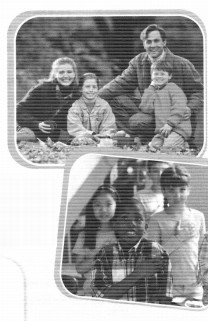
You have the right to:
• belong to a country
• take part in politics
• go to school
• live in freedom and safety
• have a private lite
• have opinions, speak them&share them with other people
• to be treated equally by the law
• follow the religion you want to
Nobody hes the right to:
• treat you as his or her slave
• punish you or put you in
prison without a good reason
• take your things from you
without a good reason
• torture you
• take away your rights
1 What is a 'green citizen'? Read the introduction to find out.
> SI: A green citizen conserves as much water as they can, for example by always turning off the tap when... etc.
2 Are you a green citizen? Do the quiz, then mark each sentence A (=always/very often), B (=sometimes/occasionally) or C (=never/ hardly ever). Explain the words in bold.
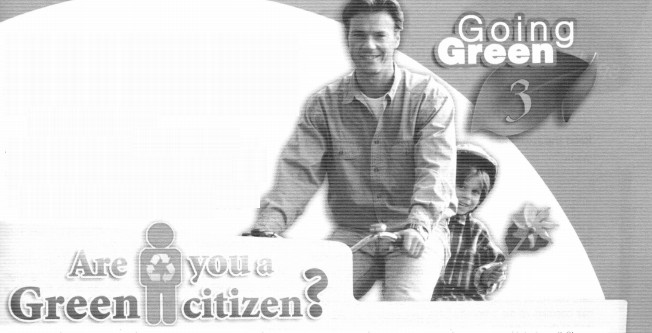
We are all citizens of Planet Earth and rely on it for food, air, water and much more, so not only is it our responsibility to care for the environment, it's also in our best interests! So, how much effort are you making to reduce your impact on the environment? Are you a bright green citizen or more of an embarrassing shade of red?
1 I try to conserve water e.g. by taking short showers, not letting taps run, keeping water in the fridge instead of letting the tap run to let it get cold, etc.
2 I walk, ride my bike, rollerblade, carpool1 or use public transport whenever I can.
3 I 'reduce, reuse, recycle' as much as I can!
4 I try to learn about nature by visiting wildlife reserves and/or national parks.
5 I put coffee grounds/fruit and vegetable peels etc on a compost heap.
6 I take part in local environmental projects e.g. litter collection/tree-planting/recycling projects etc.
7 I buy unprocessed, organic and locally-grown food.
8 I check that the products I buy, e.g. cleaning products, electrical equipment, are safe for the environment.
9 I turn off computers/lights/electronic equipment when I'm not using them.
10 I buy from environmentally responsible businesses.
11 I use rechargeable instead of disposable batteries.
12 I refuse plastic bags in the supermarket and use my own cloth bags instead.
13 We use energy-saving light bulbs at home instead of ordinary ones.
14 I buy products in bulk with as little packaging as possible.
15 I am generally interested in environmental issues and try to stay informed.
1 sharing the use of one car
Mostly As
You are well on your way to winning the 'green citizen of the year' award! Keep up the good work!
Mostly Bs
Well ... not bad but you could do better! Remember, it's the survival of our planet we're talking about here!
Mostly Cs
Come on, you can do better than that! Set yourself a few achievable targets. It's never too late to get started!
3 Compare your results with your partner. What can you do to become 'greener'? Discuss in pairs.
A: Well, I guess I could take shorter showers.
B: Yeah, me too. Also, my dad often takes me to school in the car, so I could ...
4 Think! Do you agree with the statement? Why/Why not?
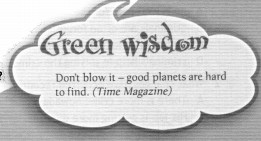
Read the text, then choose A, B, C or D for each question (1-7).
Caught in the'Act
Even if you're looking carefully, you might miss it; it's only a stray strand of hair, after all. But to me, as a forensic scientist, this is what I live for; this is the pot of gold at the end of the rainbow. This microscopic human trace might be the one vital piece of evidence that leads to the arrest and imprisonment of the criminal, the one who, without realising it, left his calling card behind at the scene of the crime. One single strand of hair contains all the criminal's DNA and, once matched, can lead all the way back to his door.
And that is my job. I'm a forensic scientist - forensic' just means relating to the legal system - and I collect and analyse evidence that is then used to catch a whole range of criminals committing any number of illegal acts. A member of the public might jump to the conclusion that all I work on are murders, but my field of investigation includes burglaries, arson, simple cases of forgery or more advanced Internet offences. Since time began, criminals have always found new ways of breaking the law, but I have complete faith in my subject. It doesn't matter what the crime is, science will get to the bottom of it and as technology continues to improve, the chances of getting away with it become slimmer and slimmer.
Perhaps the most famous forensic scientist of all was Sherlock Holmes. His methods of investigation, popularised in numerous books, films and television series, included close observation, rigorous examination of evidence and logical deduction. This is where I got my inspiration from. Reading the stories and watching the films fascinated me when I was younger and they still do today. I took all available science courses at school and then moved on to criminology at university. After graduating at the top of my class, it was then a small step to the police and I'm now head of the forensic investigation department.
In many ways the job hasn't changed all that much from the fog-filled streets of Holmes' London. The most useful tool for any scientist is still a keen mind, a good eye that connects the apparently unconnected and a skilful reading of the evidence. A crime scene is not that different to a story. It is a narrative with a beginning, in which the criminal enters the house; a middle, when the crime is committed; and a climax, as the criminal leaves the crime scene. My job is to make sure that the ultimate end is the capture of the villain.
Of course, there is a new style of fictionalised forensics on television nowadays that uses the most cutting-edge technology available and suddenly the job is the focus of a huge amount of attention with relevant university courses filling up faster than ever before. But don't be fooled by what you see on television. The job is vastly different from the one seemingly done by the heroes of a weekly TV show. First of all, the forensic scientist isn't the first one at the scene of the crime; we're usually there much later. Also, forensics can be a time- consuming and lengthy procedure. TV takes one hour to solve the crime; we can take weeks, months, even years. DNA analysis takes a long time, no matter how technologically advanced we are. But having said all that, the basic methods we use are the same as our TV counterparts.
Take fingerprinting, for example. A person's fingerprint is unique; the lines and shapes that pattern the fingertips are individual and belong to no-one else. The grease that comes off our skin at all times of the day leaves a patterned mark on everything we touch. We can make a copy of that mark and, hopefully, match it to the recorded fingerprints of known criminals. This is common knowledge and even the most simple-minded crook knows enough to wear a pair of gloves or wipe down everything he touches. But what about the traces that can't be seen, the traces that can't be wiped down?
At every second of every day your body is shedding microscopic pieces of skin; household dust is mostly made up of your dead cells. You are constantly renewing hairs, old ones fall and new ones grow back; the clothes you wear leave behind the smallest signs of where you've been and what you've been doing. This is called DNA fingerprinting and when gathered together, all of these things serve to build up a picture that is more conclusive than any eye-witness statement. Evidence doesn't lie when it faces a jury. Facts don't forget or get confused. Science states the case. And that is inescapable.
1 In the first paragraph, the writer suggests that
A he is well-paid for the work he does.
B criminals are often forgetful.
C he follows criminals to their homes.
D criminals help in solving the crime.
2 What changes have occurred recently?
A There is more crime nowadays.
B His job is getting more difficult.
C More criminals are being caught.
D He has more work than ever before.
3 Why did the writer become a forensic scientist?
A Because he was good at science.
B Because of his enthusiasm for books.
C Because of a childhood role model.
D Because he wanted to be a policeman.
4 The writer compares a crime scene to a story to
A explain how events are connected.
B describe how he finds evidence.
C make him feel more like a hero.
D show how to commit a crime.
5 Watching crime shows on television, viewers get the idea that
A doing the job will make them famous.
B solving a crime takes very little time.
C the forensic scientist heads the investigation.
D forensic science is a popular university course.
6 What does not the writer say about fingerprinting?
A Most people understand the technique.
B Unwashed hands are easier to fingerprint.
C Criminals try to avoid leaving fingerprints.
D No two sets of fingerprints are the same.
7 What does the writer believe about forensic science?
A It relies too much on the ageing process.
B It is a reliable method of solving crime.
C It often disagrees with personal accounts.
D It is not used enough in criminal investigations.
RNE Use of English
Fill in the gaps with the correct word derived from the words in bold.
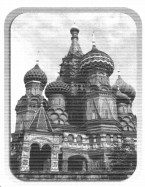
"Welcome to the Kremlin, the seat of Russia's 1)......... (rule) for centuries and currently the 2)........ (office) residence of the president of Russia! This 'city within a city' contains golden-domed churches and cathedrals, four palaces, museums, 3)..........(resident), offices and monuments. Visit Cathedral Square, the 4).........(history) heart of the Kremlin and home to the Cathedral of the Assumption, where all the Tsars were crowned. Along the Kremlin's eastern wall lies Moscow's famous Red Square.
Don't miss St Basil's Cathedral at the 5)........ (south) end of the square, famous for its brightly 6)..........(colour) domes. This stunning cathedral was built between 1534 and 1561 at the command of Ivan the Terrible. As the story goes, Ivan was so overcome by its beauty that he blinded its 7)...........(architecture) so that he would never be able to create another 8)..........(build) as magnificent for anyone else! Our tour continues..."
RNE Listening
Listen to the speakers 1-5. Which of the comments below might each speaker say? There is one comment you don't need to use.
A I think all teenagers should do chores.
B I have more responsibilities because I'm older.
C Chores take up a lot of my free time.
D I find cleaning relaxing.
E I'm too busy to help out much.
F I don't mind doing outside chores.
| Speaker
| 1
| 2
| 3
| 4
| 5
|
Comment
|
|
|
|
|
|
RNE Speaking
You and your friend want to do something special to relax and celebrate the end of your exams. Discuss the following options and choose the one you both like most of all.
• a day at the beach
• a trip to a theme park
• a party for all your friends
• a DVD evening with a few close friends
You begin the conversation and have to decide on which option (only one) to choose. Your partner will play the part of your friend. Remember to:
• discuss all options • take an active part in the conversation and be polite • come up with ideas
• give good reasons • find out your friend's attitudes and take them into account • invite your friend to come up with suggestions • come to an agreement
RNE Writing
Read the extract from your pen friend Tanya's letter. Write a letter to Tanya. In your letter:
• tell her about the kinds of household chores you have to do;
• ask three questions about the tree-planting day.
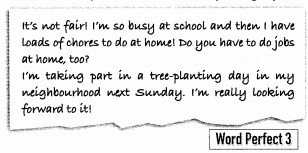

1 Fill in: fee, scam, identify, suspect, grabbed, contacted, witness, seized, glared, disposable.
1 The boy............the old lady's bag and ran off.
2 Don't buy.........batteries, use rechargeable ones.
3 Fraudsters use a........to trick people and take their money.
4 The police..........a stash of stolen goods during the course of the investigation.
5 The kidnappers .......... the family with their demands.
6 I thought something was wrong when they asked me to pay a.......to process my claim.
7 I have to go to court because I was a...........to a car accident.
8 The man was attacked from behind so he was unable to...........who did it.
9 She ....................at her attacker as he was taken away.
10 The police are holding a ...............for questioning.

2 Put the verbs in brackets into the correct form.
1 We enjoy............(walk) in the park on sunny days.
2 I might ............... (go) away this weekend.
3 You don't fancy...............(watch) TV tonight, do you?
4 He has decided...........(buy) a new car.
5 I refuse................(speak) to him any more.
6 He left without................(say) goodbye.
7 We want................(thank) you for your help.
8 Bob has...............(work) late tonight.
9 Peter would..............(enjoy) this book.
10 How about....................(have) a pizza for supper?

3 Complete the sentences using the words in bold. Use two fine words.
1 Ryan has been learning to drive sence last year.
began Ryan ...........last year.
2 We need to redecorate the lounge this year.
needs The lounge ............. this year.
3 If only I hadn't walked home alone last night.
regret I ..............last night.
4 The closing date for applications was yesterday.
late It's ........... , the closing date was yesterday.
5 She doesn't usually overreact like that, unusual It is very............like that.

4 Complete the phrasal verbs with the correct particle.
1 If you don't keep the noise ............... I'll call the police!
2 Keep...........from unlit areas at night!
3 Tell me everything, don't keep anything.....................
4 If you keep............ driving like that, you'll have an accident.
5 Paul couldn't keep ............ the workload, so he got an assistant.

5 Fill in the gaps with the correct preposition.
1 Speeding is..........the law and if caught, you will get a fine.
2 The boy was charged.............shoplifting.
3 She tricked her little brother .................. giving her his chocolate.
4 Maggie is responsible............looking after three small children.
5 The main requirements ............... the job are honesty and punctuality.

6 Match to form exchanges.
|1 | | That's totally disgraceful! a Yes, I do. I
|2 | | I'm so sorry. I didn't feel really
mean it. bad about it.
|3 | | My grandma was mugged. b That's
shocking!
|4 | | Am I really that bad?
c I agree!
|5 | | You don't need to d That's alright.
apologise.
e I'm afrajd so.

Now I Can ...
• talk about crime, criminals and the law
• talk about rights & responsibilities
• express regret
• write an opinion essay
• talk about being a green citizen
.....in English
Английский язык. 11 класс : учеб. для общеобразоват. учреждений / [О.В. Афанасьева, Дж.Дули, И.В. Михеева и др.]. - 2-е изд., доп. и перераб. - М.: Express Publishing : Просвещение, 2009. - 244 с. : ил. - (Английский в фокусе).
Планы конспектов уроков по английскому языку 11 класса скачать, учебники и книги бесплатно, разработки уроков по английскому языку онлайн
Содержание урока
 конспект урока конспект урока
 опорный каркас опорный каркас
 презентация урока презентация урока
 акселеративные методы акселеративные методы
 интерактивные технологии
Практика интерактивные технологии
Практика
 задачи и упражнения задачи и упражнения
 самопроверка самопроверка
 практикумы, тренинги, кейсы, квесты практикумы, тренинги, кейсы, квесты
 домашние задания домашние задания
 дискуссионные вопросы дискуссионные вопросы
 риторические вопросы от учеников
Иллюстрации риторические вопросы от учеников
Иллюстрации
 аудио-, видеоклипы и мультимедиа аудио-, видеоклипы и мультимедиа
 фотографии, картинки фотографии, картинки
 графики, таблицы, схемы графики, таблицы, схемы
 юмор, анекдоты, приколы, комиксы юмор, анекдоты, приколы, комиксы
 притчи, поговорки, кроссворды, цитаты
Дополнения притчи, поговорки, кроссворды, цитаты
Дополнения
 рефераты рефераты
 статьи статьи
 фишки для любознательных фишки для любознательных
 шпаргалки шпаргалки
 учебники основные и дополнительные учебники основные и дополнительные
 словарь терминов словарь терминов
 прочие
Совершенствование учебников и уроков прочие
Совершенствование учебников и уроков
 исправление ошибок в учебнике исправление ошибок в учебнике
 обновление фрагмента в учебнике обновление фрагмента в учебнике
 элементы новаторства на уроке элементы новаторства на уроке
 замена устаревших знаний новыми
Только для учителей замена устаревших знаний новыми
Только для учителей
 идеальные уроки идеальные уроки
 календарный план на год календарный план на год
 методические рекомендации методические рекомендации
 программы программы
 обсуждения
Интегрированные уроки обсуждения
Интегрированные уроки
Если у вас есть исправления или предложения к данному уроку, напишите нам.
Если вы хотите увидеть другие корректировки и пожелания к урокам, смотрите здесь - Образовательный форум.
|




















